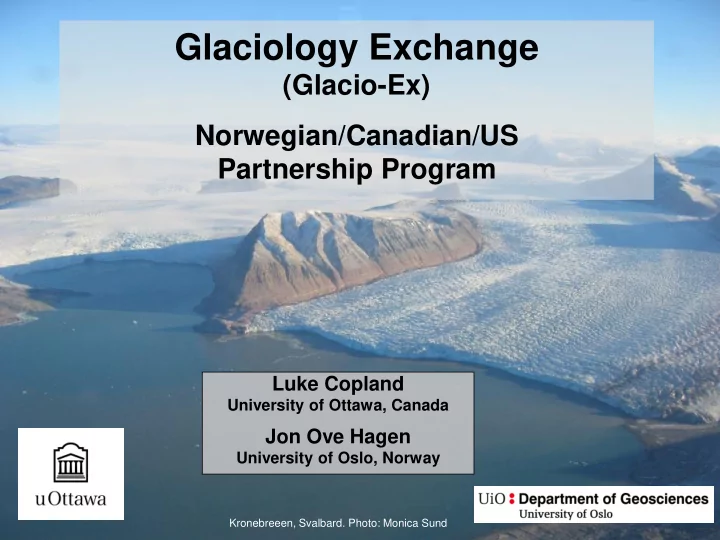

Glaciology Exchange (Glacio-Ex) Norwegian/Canadian/US Partnership Program Luke Copland University of Ottawa, Canada Jon Ove Hagen University of Oslo, Norway Kronebreeen, Svalbard. Photo: Monica Sund
The Cryosphere is changing! http://www.nasa.gov/to pics/earth/features/gra ce20120208i.html Changes in ice thickness (in centimeters per year) during 2003-2010 as measured by NASA's GRACE satellites, averaged over each of the world's ice caps and glacier systems outside of Greenland and Antarctica
Late 19 th century ice shelf extent (~9,000 km 2 ) Alert Eureka
Late 19 th century ice shelf extent (~9,000 km 2 ) July 2005 Extent (1043 km 2 ) Alert Eureka
Late 19 th century ice shelf extent (~9,000 km 2 ) Markham Ward Hunt July 2005 Extent (1043 km 2 ) Ayles Sept 2012 Extent (~500 km 2 ) Milne Alert Petersen Serson Eureka
Who cares?! • Melting glaciers raise sea level: greater impact from storm surges • Ice islands major concern for offshore oil exploration • Changing sea ice impacts arctic shipping routes
Glacio-Ex Glacio-Ex project is focused on the terrestrial cryosphere: glaciers, snow, ice shelves, permafrost and seasonal frost in sub-Arctic, Arctic, and high mountain environments Primary funding from SIU (Norwegian Centre for International Cooperation in Higher Education), Partnership Program for North America: 2012- 2016 We have a common and pressing need to learn from each other’s research, and to expose university students at all levels to the similarities and differences in environmental and societal conditions in the North This project aims to strengthen scientific cooperation, research interaction and educational activities between the project partners
The Partnership • 2 from Norway • 3 from Canada • 1 from USA University Centre in University of Oslo Svalbard (UNIS), Department of Geosciences Department of Geology (Jon Ove Hagen, (Doug Benn) Project Leader) University of Ottawa Simon Fraser University, Department of Geography Dept. Earth Sciences, (Luke Copland, North (Gwenn Flowers) American Coordinator ) University of Alberta, Earth University of Alaska Fairbanks, and Atmospheric Geophysical Institute Sciences, ( Regine Hock ) ( Martin Sharp )
Science Exchange Science Workshops Research sites of Cryo-Ex partners – At least one science workshop per year – One at every partner over the next 4 years Exchange visits of faculty & grad students – Sabbaticals – Writing joint papers Research – Sharing field equipment, develop new techniques – Inter-comparison between methods
Field instrumentation
Student and Faculty Training Joint courses, MSc and PhD level Yukon Permafrost Course, 2011 – Develop new courses, build on existing ones – E.g. Remote Sensing of Glaciers, Oslo Summer field schools – Specialized field courses to train graduate students and researchers Undergraduate student exchanges Svalbard Tidewater Glaciers Workshop, 2012 – Students go for entire semester – ~75% of past participants continue in graduate studies
Kananaskis Field Station Summer Schools 2013: Wireless sensor networks – Kananaskis Field Station, Alberta, Canada 2014: Glaciology field techniques Wrangell Mountains Center – Wrangell Mountains Center, McCarthy, Alaska 2015: Tidewater glaciers and permafrost – UNIS, Svalbard, Norway 2016: Permafrost and glaciology – Kluane Lake Research Station, Yukon, Canada Kluane Lake Research Station UNIS
Field course on alpine landscapes, Norway
Field course on glaciers and permafrost, Svalbard
GEG4001: Northern Field Research, Yukon/Alaska
GEG4001: Northern Field Research, Yukon/Alaska
GEG4100 Glaciology: Patagonia, Argentina
GEG4100 Glaciology: Antarctica
Practical Issues Commercial flights to Canadian Arctic very expensive – Ottawa-Resolute ~$5600 – Ottawa- Longyearbyen ~$2000 Food costs very high in Canadian Arctic (& poor quality) $800 $5600 $1200
Practical Issues Charter flights cheap in Canada/US – Twin Otter ~$2000/hr – Helicopters ~$1000-$2000/hr – Svalbard >$5000/hr Unrestricted flying in Canada/US – Few regulations, can land essentially anywhere – Can only fly in Svalbard with permission of the Governor – Also unrestricted snowmobile use in US/Canada Major aircraft support for Canadians from Polar Continental Shelf Project – Operate logistics base in Resolute Bay – Virtually all equipment and flight hours provided free of charge to researchers
Conclusions Glacio-Ex provides unique connection between leading cryospheric research groups in Norway and North America Glacio-Ex will establish closer, formal linkages and exchange arrangements, and will train the next generation of cryospheric scientists The exchange is expected to lead to long-term collaborative ties between researchers, and graduate and undergraduate students in all three countries
Thankyou!
Recommend
More recommend